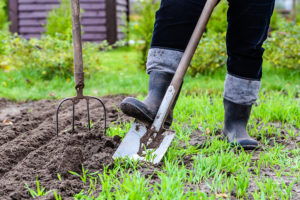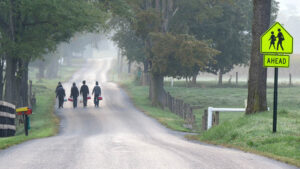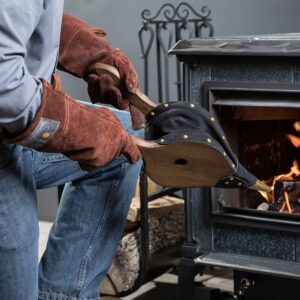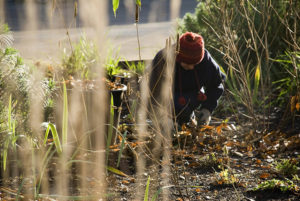
It’s a disturbing thought to many people that civilization –or at least what we think of as civilization— depends almost entirely from a slender thread known as electricity, a thread so slender it’s actually invisible. Our generation and those few before us have grown up taking it almost entirely for granted. That is, we take it for granted…until one chilly spring night when, -bink!-, the power goes out. Generally this takes place ten minutes before the end of a thrilling movie, but this astonishing fact is neither here nor there as far as our discussion goes.
So, what do we do? Well, mostly fumble around in the dark, stubbing toes and whacking shins while cursing whomever it was that used the GOOD flashlight and DIDN’T put it back where it goes…that kind of thing. Finally, somebody locates a working torch; it’s about the size of a cheap cigar and somehow sports a 70 watt microfilament bulb, but it works. The first thing they do is flick it on and then shine it directly in your eyes, utterly blinding you to further injury when you stagger backward and collide with many of the same objects you just collided with a minute ago while looking for the flashlight. Â
Regardless, with a working light you now launch a search for the cordless telephone to see if you can establish communication with the rest of the world. Why isn’t it on the table? Where the blazes is that stupid telephone? Why can’t ANYONE ever put things back where they go in this house? Honestly, you try to– wait a minute, shine the light over here – NO! NOT IN MY FACE! Over h- (-bonk!-) Aarrgghh!…my shin…

But there it is, on the floor beside the armchair: the telephone. And…it doesn’t work!…because the power is out. The unit lights up, but the thing it’s transmitting to is plugged into the 120 V and cold and dead as Julius Caesar. And speaking of cold, why doesn’t somebody turn up the…oh, never mind. The power is out. The furnace won’t work.
Aha! Someone has located a candle. But, no matches. OK, we’ll keep looking. Now, what’s this glow of light coming down the stairs? Ah, someone has found her cell ’phone, and amazingly, it still works! Great. Call the _______s next door, and see how they are. And lo, even though the _______s are called, they answer not. They are called again. A vague light is even glimpsed coming from one of their windows, so they’re at least up — and yet they do not answer their telephone! Well, of course not, you realize; they have a cordless telephone, what’s just as dead as the Roman emperor, ours, and everybody else’s.

Somebody gets an idea and goes outside with the working flashlight to locate a book of matches in the glove compartment of his car, letting a ferocious torrent of freezing air blast into the suddenly re-darkened room; only then do many realize they’re standing around in their nighties. A slow general retreat is made to various stygian bedrooms to fumble and flail and pull drawers all the way out to locate clothes, which are also freezing cold to the touch.
Someone downstairs announces they want something to drink and opens the refrigerator. There is a long, protracted silence punctuated only by the little clinkety-clankety noises of bottles touching, until there is a series of tremendously glassy CRASHES. Yes dear, all right– I’m going to check to see she’s OK—yes dear, yes, I’m just now going– (-bonk!-) Aarrgghh!…my shin…
This was the scenario for our first cold-weather blackouts, many years ago. We had them pretty routinely, though the power was usually restored within a day or so and our lives resumed their regular oblivious trajectories. But finally one very wet winter the power went out for six and a half days, causing a lot of trouble for a lot of people all at once, and provoking my household to change its attitude to modern conveniences.
Electricity is like the digital age itself: it’s either on and working, or off and inert – no half measures, nothing in between. When it’s working, it’s great. But when it isn’t, you’re stuck. But the degree to which you’re stuck is variable, and that variability is dependent not on the electricity but on how much you allow yourself to be reliant upon it. The less reliant you are upon it, the less your life will be impacted by its absence; really it’s that simple. The tricky part is how you become less reliant upon it.

I say it’s tricky, because when you start doing without conveniences like electricity you are obliged to start accepting more personal responsibility for keeping useful things going in your life. For instance, because you can’t trust battery operated clocks to work when you need them (they die without warning), I have mechanical clocks in my home even though they require winding and periodic minor adjustment — but they work when there’s power or not, and their constancy is a reassurance. I have a mechanical coffee grinder because it always works, and in fact works better than the old electric one. And though I share these thoughts with you from a shiny computer, I still keep my beloved 1939 Royal upright typewriter in good condition, and it works even by candlelight.
More substantially, to continue your life when the power is out you will need to address the basic daily necessities of Light, Water, Heat, Food, and Company.
Without electric Light, the night can become a fearsome thing to someone who feels they are trapped in the darkness. A flashlight is great, but finding one in the sudden dark can be a terrible experience, so it’s a good idea to have one stored permanently someplace like under the sink or in a linen closet; too, the batteries have to be good, unless you keep one of those handy no-batteries-needed flashlights with the crank generator, which are very useful but only if you have two hands free. Thus, the importance of even a few candles and the matches to light them! Candles are so cheap and easy to use, though for safety’s sake the glass-enclosed “votive†style candles are the safest, particularly if they are to be taken into the bedroom of a younger family member. Open flames are but treacherous allies.
From experience I can tell you that making candlelight a regular part of your life is not such a bad thing; it adds a lovely touch to any supper (even when the power is up and working!), the outdoors is made warmer and friendlier-looking in the glow of a Dietz lantern, and in an outage a single Aladdin mantle lamp will become a veritable Lighthouse of Alexandria for you.
Our lives require Water, rather a lot of it, both potable and non-potable; the former is for consumption, the latter to assist in elimination (i.e., flushing a toilet). Bottled potable water is now commonly available but ought to be stored up only for a set length of time, which means you have to change it out with new stock and consume the old before it goes foul. Potable water storage can also be done by freezing, which is extremely handy living in a cold-winter climate. A great deal of potable water can be stored in the form of ice cubes kept in a new plastic trash can stored in a cold garage or out on a shaded back porch.
Snowy climes are ideal for harvesting non-potable water, too. It should not be stored for long, but toilet flushing is a constant necessity so it generally gets used faster than you’d like. If you have a second floor, have everyone use the upstairs toilet because gravity will assist in getting things out to your sewer or septic lines more reliably. That extra boost is provided by you, of course, toting the stuff upstairs in buckets. This is a disagreeable but useful task. You get to understand why the “carrying of water†was so long relegated to slave labor. A hint for the sufferers: try to carry two buckets at once, one in each hand, to balance the strain on your lower back. Fill each one more than halfway to start with, and then others won’t spill when they hoist it to pour and flush the commode.
My home enjoys the misfortune of not being in a snowy region, meaning that non-potable water is not difficult to find because it’s raining, which is usually when the power goes out anyhow. All I did was knock out the end cap on one of my rain gutters, and set a large basin on the patio beneath it. I put a grapefruit-sized rock in the middle of the basin. An arc of water pours gracefully down with every wet storm, making a very satisfying and soothing splash when heard from my nearby bedroom, and also filling a 6-gallon plastic bucket in a very short span of time when placed in the same spot as the basin. The rock, by the way, is to deflect the inevitable “tonk-tonk-tonk†sound when the basin is empty and it’s only misty outside.

As regards shelter and the Heating of same, the obvious choice is a wood-fired stove. We bought the smallest unit we could find that still has a catalytic re-burner, a ceramic screen device inside it which not only dramatically reduces what you spew outside from your chimney, it delivers more heat where you want it, namely inside the house. We chose an ordinary wood stove instead of a pellet stove, because it will accept any ordinary wood as fuel instead of a specialty product only available for money. This means that if one has a decent chainsaw, a splitting maul, and a few friends in one’s community, one needn’t lack for heat ever again nor spend much money for it. A remarkable number of people living around you will be glad to fob off an old dead tree on you because it saves them the hassle of having to deal with it themselves.

Be alert for these opportunities, and you will get a reputation as the guy to call when there’s some cheap firewood to be had. Any construction site, if such a thing happens to be in your vicinity, is a veritable gold mine of scrap softwood lumber which they are often glad to be rid of –though, a word of caution in this, as you must be sure you are collecting only wood itself, not painted wood, plywood, treated wood, nor the “wood products†like glulam so commonly used in modern buildings. These are bits of wood glued together with very nasty adhesives that should NEVER be burned!  Be alert for this.
Your wood stove will suddenly become the center of your temporarily non-electric life, and will teach you why the hearth was always considered sacred. Your fire will keep you warm, it will boil your coffee water, cook your food, warm your bathwater and even dry your laundry if it comes to that. I have found that in midwinter it’s actually easier to use a fold-up laundry rack to drape wet clothes over for drying in front of the fire, than to use the dryer outside in the cold garage. That poor machine out there is obliged to draw in very cold air and heat it up sufficiently to take very cold, very damp clothes and heat them to the point where their own water will evaporate away. It needs a lot of fuel (both electricity and natural gas, in our case) to do this. Our wood stove is already lit anyway, and during the day when people are out at school or at work, it’s not inconvenient for me to set up the laundry rack to dry out damp clothes in the middle of the parlor. By evening, the house is cozy warm and the clothes are dry.
Now, building a fire is less convenient that merely flicking a switch on the wall, but it works when the power is out.
Careful Food storage is always important, and for emergencies this should include a standard selection of things in your pantry which don’t require refrigeration like beans, rice, pasta and tinned goods. A certain amount of perishable food is usually in the ’fridge and freezer, however, and its life can be prolonged in this fashion: save a few 2-liter soda bottles, well rinsed out. Fill them with drinking water to no more than 2/3 of their capacity, and store them in your freezer. When your power goes out, transfer them (along with some frozen food, if you have any) into the refrigerator and they will help to keep it cool over a period of many hours, giving you a chance to consume all the perishables before they spoil, and when the frozen soda bottles do eventually melt you will have that much more potable water to drink.
Lastly, when the power is out for a prolonged period of time it’s best to be in the Company of others, at least now and then. If you’re injured you’ll need help of course, and even if not the reassurance of fellow humans who are all in the same boat is a comfort: someone will always have the one thing you’re missing, or know some critical thing you don’t. Plus, someone around you will always be caught with inadequate food laid by, or no heat, or no water, and the only way you might learn of this is to meet up with them. Gathering a number of people to eat at a communal hearth is much easier than cooking many separate meals, and it helps strengthen your community ties.

Keeping an old-fashioned dial telephone plugged into the wall keeps you in touch during a power outage, because the ’phone lines are usually intact and the old dial unit’s power is supplied through the land line. You’ll have the added satisfaction of watching younger individuals try to figure out how your dial ’phone works, too.
In short, learning to go without the convenience of electricity in a general way, will make your sudden plunge into the non-electric “emergency world†that much less distressing. And you can always practice — simply by walking out to the breaker box by the side of the house and yanking the main switch. Do this without announcements or preparation, and you might find exactly how well prepared your family is for the upcoming dark.





























I am glad to know how to survive without depending on so much! I know many times as a child growing up I didn’t understand the ‘whys’ of it all, turns out though, the ones that raised me up were very wise indeed teaching me how to survive without those things many deem luxuries! So we didn’t have running water unless we pumped it, the lights didn’t turn on from a switch on the wall, the home wasn’t heated by a modern day furnace… but the we were always well cared for and had enough :)
Like the others who have commented here, I’m grateful to have grown up without the luxuries that people take for granted nowadays. My garden and my chickens provide most of my food, and I can get along just fine without electricity if I have to. Would miss my computer, though.
I grew up in the city and until recently have always lived in cities. I hae electricity but am taking steps to not be so dependant on it. Some of my friends think it is silly and just political correctness to go solar or wind, etc. but they sure complain when they lose power or get really high energy bills.
I had a great day the last time the power was out – read on the porch, hung out with the neighbors, and worked outside. It’s not so great at night when it’s cold, but when the weather’s nice, it can be a blessing to get that kick in the butt to turn off the TV and computer!
we would hardly notice, except for the computer. Wood stove to heat with and cook on. Kerosene lamps, no dishwasher here except me. No time for television. We have an old phone, nothing electric about it. Living simple sure makes things easier.
I love it that way. I feel like I am in control of me and not someone or something I don’t eeven know in control of me.